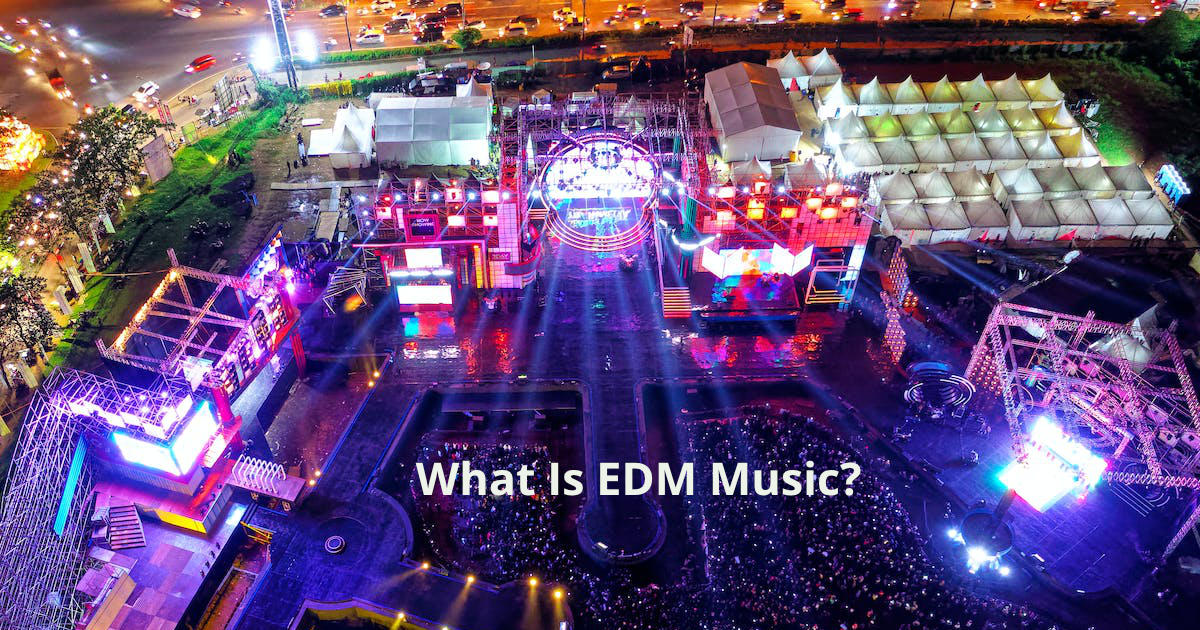Estimated reading time: 7 minutes
EDM music, short for Electronic Dance Music, has become a global phenomenon in recent years. This genre of music has taken the world by storm, captivating millions of listeners and dominating the music industry. But what exactly is EDM music, and why has it gained such immense popularity? In this article, we will explore the origins of EDM music, delve into its various subgenres, discuss its impact on the music industry, and analyze its characteristics and evolution over the years.
Table of contents
- The Origins of EDM Music
- Key Pioneers and Influencers in EDM Music
- Exploring Different Subgenres of EDM Music
- The Impact of EDM Music on the Music Industry
- Characteristics of EDM Music
- The Role of Technology in Creating EDM Music
- How EDM Music Has Evolved Over the Years
- The Global Reach and Popularity of EDM Music
- Conclusion: The Future of EDM Music and Its Continued Influence on the Music Industry
- FAQ
The Origins of EDM Music
EDM music can trace its roots back to the 1970s and 1980s when electronic music started to emerge. Influenced by the rise of disco and the advancements in technology, artists began experimenting with synthesizers and drum machines to create a new sound. One of the pioneers of EDM music was Giorgio Moroder, an Italian producer and songwriter who collaborated with Donna Summer on the iconic track “I Feel Love.” This song, with its pulsating electronic sounds and infectious beats, laid the foundation for the future of EDM music.
Key Pioneers and Influencers in EDM Music
Several key figures have played a significant role in shaping and popularizing EDM music. One such figure is David Guetta, a French DJ and producer known for his energetic and catchy tracks. Guetta’s collaborations with mainstream artists brought EDM music into the mainstream and introduced it to a wider audience. Another influential artist in the EDM scene is Armin van Buuren, a Dutch DJ and producer who is considered one of the pioneers of trance music. With his uplifting melodies and euphoric beats, van Buuren has become a symbol of the genre.
| Pioneers and Influencers |
|---|
| David Guetta |
| Giorgio Moroder |
| Armin van Buuren |
Exploring Different Subgenres of EDM Music
EDM music encompasses a wide range of subgenres, each with its own unique characteristics and style. One of the most popular subgenres is progressive house, known for its melodic and uplifting sound. Artists like Swedish House Mafia and Avicii have made significant contributions to this subgenre, creating anthems that have become synonymous with EDM music. Deep house, on the other hand, is characterized by its soulful and atmospheric vibe. Artists such as Disclosure and Maya Jane Coles have brought deep house to the forefront of the EDM scene.
| Subgenres of EDM Music |
|---|
| Progressive House |
| Deep House |
| Trance Music |
| Drum & Bass |
There are also many other subgenres worth mentioning, such as techno, hardstyle, vocal trance, progressive trance, acid house, dubstep and many more.
- EDM vs Techno – The difference between EDM and Techno
The Impact of EDM Music on the Music Industry
EDM music has had a profound impact on the music industry, reshaping the way music is produced and consumed. With its infectious beats and energetic sound, EDM music has become a staple in clubs, festivals, and radio stations worldwide. Electronic music festivals, such as Tomorrowland and Ultra Music Festival, have gained immense popularity, attracting millions of attendees from around the globe. EDM artists have also achieved mainstream success, collaborating with A-list musicians and topping the charts. The rise of EDM music has opened doors for new artists and created a vibrant and thriving industry.
- From House to Drum and Bass: Understanding the Genres of EDM
Characteristics of EDM Music
EDM music is characterized by its use of electronic sounds, heavy basslines, and floor-shaking beats. The genre often features repetitive and catchy melodies that are designed to keep listeners hooked. The beats per minute (BPM) of EDM tracks are typically higher than other genres, creating an energetic and pulsating rhythm. The use of synthesizers and drum machines allows artists to create unique and futuristic sounds that define the genre. Whether it’s the thumping bassline of a progressive house track or the euphoric melodies of a trance anthem, EDM music is designed to make you move.
- House vs EDM: Understanding the Intricacies and Evolution of Two Dominant Subgenres of Electronic Music
The Role of Technology in Creating EDM Music
Technology has played a crucial role in the creation and evolution of EDM music. Drum machines and synthesizers have become essential tools for producers, allowing them to manipulate and shape sounds in ways that were previously unimaginable. The advent of digital audio workstations (DAWs) has also democratized music production, making it more accessible to aspiring artists. With a laptop and a few software plugins, anyone can create professional-sounding EDM tracks from the comfort of their own home. Technology has empowered artists to push the boundaries of creativity and explore new sonic territories.
- What is Dance Music? Exploring the Heartbeat of Dance Music

How EDM Music Has Evolved Over the Years
Since its inception, EDM music has undergone significant changes and evolutions. In the early days, artists drew inspiration from disco and house music, creating tracks with infectious grooves and catchy hooks. As the genre grew, it branched out into various subgenres, each with its own distinct style and sound. Technological advancements have allowed artists to experiment with new sounds and push the boundaries of EDM music even further. Today, EDM music continues to evolve, incorporating elements from other genres and embracing new production techniques. The genre remains dynamic and ever-changing, reflecting the diverse tastes and influences of its listeners.
- Types of Electronic Music: Discovering the Fascinating Genres within Electronic Music
The Global Reach and Popularity of EDM Music
EDM music has transcended borders and language barriers, becoming a truly global phenomenon. Its infectious beats and energetic sound have resonated with audiences from all corners of the world. EDM festivals attract thousands of international attendees, creating a sense of unity and togetherness. The rise of streaming platforms and social media has also contributed to the global reach of EDM music, allowing artists to connect with fans on a global scale. The popularity of EDM music shows no signs of slowing down, as new artists continue to emerge and captivate audiences with their unique sound.
Conclusion: The Future of EDM Music and Its Continued Influence on the Music Industry
As we look to the future, it’s clear that EDM music will continue to play a significant role in the music industry. Its infectious beats and energetic sound have become a staple in clubs, festivals, and radio stations worldwide. The genre’s ability to evolve and adapt to new trends ensures its longevity and relevance. EDM music has also paved the way for new artists and genres, inspiring a new wave of creativity and innovation. As technology continues to advance and audiences’ tastes evolve, EDM music will undoubtedly continue to push boundaries and captivate listeners around the world.
If you’re curious to experience the infectious beats and energetic sound of EDM music, why not explore some of its subgenres and discover your new favorite artist? Get ready to dance and let the music take you on a journey like no other!
Related Posts
- How to Dance to EDM? The Ultimate Guide to Moving with EDM
- What are Rave Parties? Uncover the Exciting World of Electronic Dance Music
- Is House Music EDM? How House Music EDM Ignites the Party Scene
- What is an EDM Party and Why You Should Attend?
- EDM DJs – Decoding the Power Players of Electronic Dance Music
- From House to Drum and Bass: Understanding the Genres of EDM
- What is Dubstep and Why is it So Popular? Discover the Dynamic World of Dubstep
FAQ
EDM music, short for Electronic Dance Music, is a genre of music characterized by its electronic sounds, heavy basslines, and energetic beats. It encompasses various subgenres, including progressive house, deep house, trance music, and drum & bass.
Some key pioneers and influencers in EDM music include David Guetta, Giorgio Moroder, and Armin van Buuren. These artists have made significant contributions to the genre and have helped popularize EDM music worldwide.
Some popular subgenres of EDM music include progressive house, deep house, trance music, and drum & bass. Each subgenre has its own unique characteristics and style.
EDM music has had a profound impact on the music industry, reshaping the way music is produced and consumed. It has become a staple in clubs, festivals, and radio stations worldwide and has opened doors for new artists and genres.
The future of EDM music looks bright, with the genre continuing to evolve and adapt to new trends. As technology advances and audiences’ tastes change, EDM music will undoubtedly push boundaries and captivate listeners around the world.
